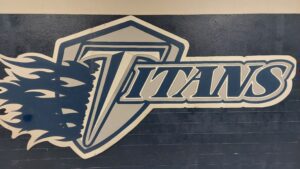Biology professor Tim Tibbetts has retired after teaching the past 22 years at Monmouth College. Does that mean he can finally chill out?

Actually, Tibbetts has been in a laid-back state his entire life, with the possible exception of his rookie year on Monmouth’s faculty.
‘What’s the hurry?’
The origins of Tibbetts’ easygoing approach to life can be traced to his earliest days.
“It was a while before I really figured out that biology was my thing,” he said. “I kind of slept-walked through grade school and middle school and high school, and as an undergrad, I was pre-med. I took the MCAT (Medical College Admission Test) and was getting ready to apply to medical schools. My father was a physician, and he said, ‘Are you sure you’re cut out for that? Are you sure you want to do that?'”
The answer, Tibbetts realized before getting too far into the process, was “No.”
Med school didn’t intrigue him, but continuing to take classes did, so he enrolled in courses at Colorado State University, where his wife, Amy Zesbaugh, attended after graduating from Lawrence University the year following Tibbetts. He worked a few odd jobs and realized he enjoyed being outside, as well as being in a college environment. One of the courses he took at CSU was “Field Biology.”
“That’s when I really figured it out,” he said. “It was like, ‘Dude, this is what you enjoy.'”
To continue enjoying it as a professor meant Tibbetts would have to earn a doctorate, which took him to Michigan State University. He did not establish a new standard for the quickest path to a degree, which he completed six years following his master’s degree from Colorado State.
“The last two years, I taught my own class, ‘The Vegetation of Michigan,’ or something like that,” he said. “Then I finally wrapped up. It was not a land speed record, but what’s the hurry?”
He’d finally become Dr. Tim Tibbetts, after all.
“It took me a while,” he said. “I have a lot of hobbies, things like brewing beer, and playing soccer and volleyball. Then I spent a year at Luther College, where the person I replaced had been with me at Colorado State. That was a totally bizarre coincidence.”
Tibbetts is also a regular tennis player – admittedly not in the same league as his father-in-law – but solid enough to occasionally rattle Ken Cramer, his longtime biology colleague. The two retirees will now have even more time to renew their friendly on-court rivalry.
Teaching at Monmouth
Of his teaching career at Monmouth, Tibbetts said, “It’s been a lot of fun. And it’s had its challenges for sure.”
One of those challenges, he said, came in his first year on the faculty. He was not only teaching new material in his zoology and botany classes – with a session of the latter subject starting at 8 a.m. each day – but his and Amy’s son “Zane had just been born, and my head was all kinds of twisted around. I was keeping ahead of my students by about a week, or maybe just five minutes or so.”
But he soon widened that gap and, along with Cramer, Kevin Baldwin and James Godde helped develop a very solid biology department. The quartet served on the faculty together for 20 years.
“Teaching field botany is at the top of the list, and ecology was another favorite of mine,” said Tibbetts. “I also enjoyed the Citizenship class that focused on sustainability. Some of the students were science majors, but some were not. That was a good challenge. For many of those students, the issues we discussed were things they’d never thought about. Just as an example, there was some statistic I used in the class about aluminum cans, and about how many 747s you could build from their waste. The students didn’t think about the world in that way.”
The Monmouth prairie fire
In addition to teaching in the classroom, Tibbetts is known for a pair of activities that take place outdoors. One, which is very related to his academic discipline, is the annual prairie burn he oversees every spring at the College’s LeSuer Nature Preserve. He’s also led annual prairie burns at the Spring Grove Cemetery outside Monmouth.
“I had limited experience,” he said. “I learned by doing and by reading. I learned what NOT to do. That process was just ‘Be patient. Go slow. It’s not a race.'” Sound familiar?
In addition to prairie burns, which are done, he said, to keep woody plants “from invading an area and turning it into a forest,” Tibbetts estimated he’d helped plant 10,000 trees and bushes at the preserve over the past two decades.
“They don’t all make it, but I always tell our students, ‘Come back in five years, in 10 years. You’ll be amazed,'” he said.
The leader of the band
Tibbetts also became director of the Monmouth College Pipe Band. That was far from his intention when he signed on to come to campus, even though he had experience with the instrument.
“Through school, I’d played the tuba in band, but there’s not much call for tuba players beyond high school,” said Tibbetts. “But I had all that wind, and playing the bagpipes intrigued me as a challenge.”
Tibbetts had acquired yet another hobby.
“Honestly, I didn’t even know there was a bagpipe band here,” he said. “I didn’t even play while I was at Luther. It was a happy coincidence. I took lessons from a student, Neal Wallace. The first time I played in the band here was a big thing for me. It was for that year’s Homecoming parade.”
Soon, Tibbetts went from a member of the band to its leader.
“Bill Turner was actually in charge of the band when I got here, but when he left, he recommended that I take over,” he said. “We started doing big road trips. We went to Charlotte, North Carolina, three or four times and we went to the Highland Games in St. Louis a couple times. We went to Lyon College, one of our main competitors, and we mopped up the floor with them. They weren’t very happy with that. They thought I must’ve brought in a bunch of ringers, but everyone who played was a student at Monmouth. I didn’t play with them there. I think the only non-student who played with us back then was Bill Myers ’85.”
At its peak under his direction, Tibbetts said the band had between 12-15 pipers and five drummers.
Looking to the future, Tibbetts will still be seen playing the bagpipe at College events, and he’ll also travel, with trips to Big Bend National Park, Hot Springs and Las Vegas on his list for this year alone.
As for a hyper-focused daily itinerary for those trips, don’t count on it. If Tibbetts wasn’t trying to set a land speed record while he was studying and working, it’s a good bet he’ll take it down another notch or two in retirement.
***Courtesy of Barry McNamara, Monmouth College***














